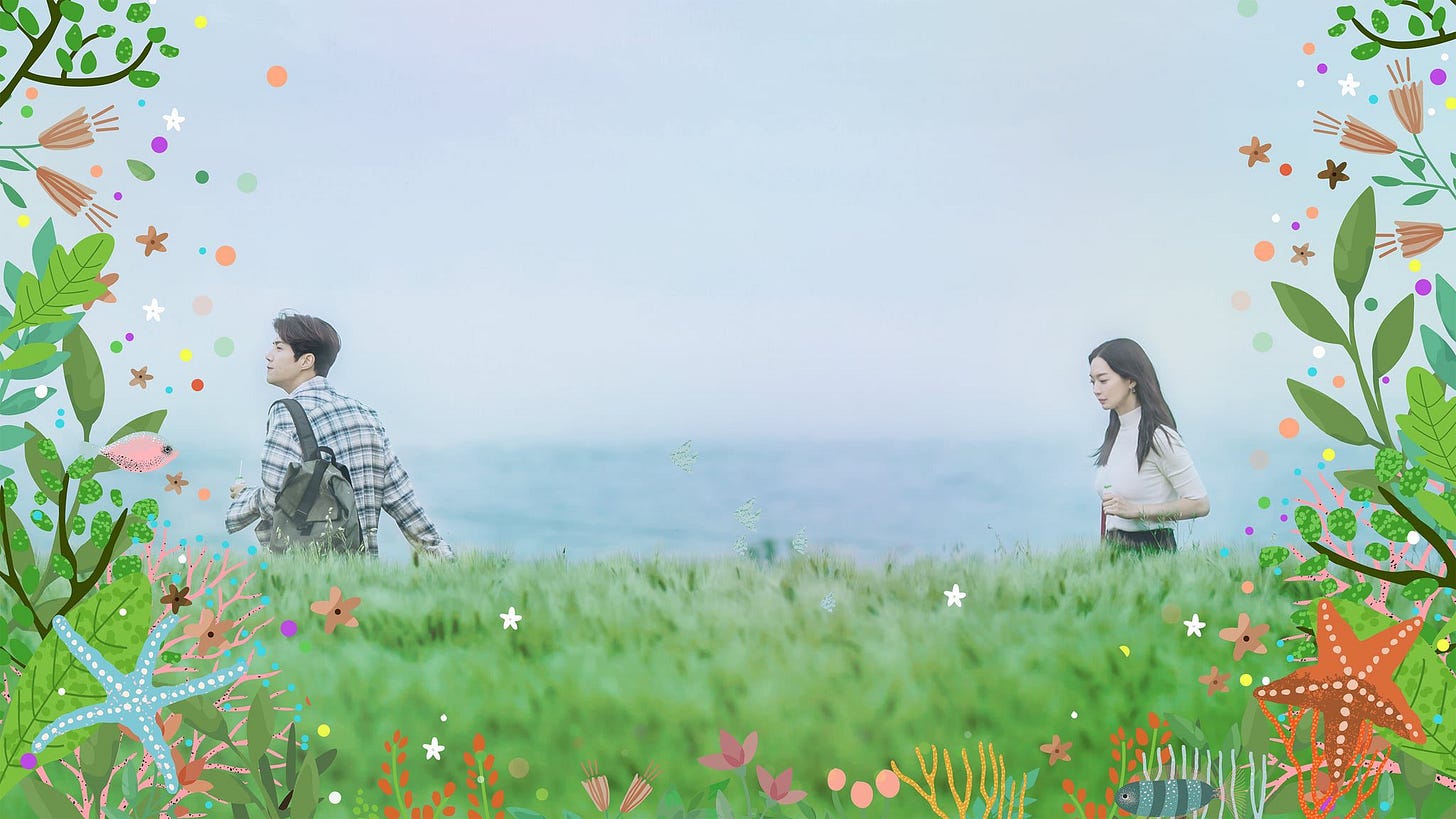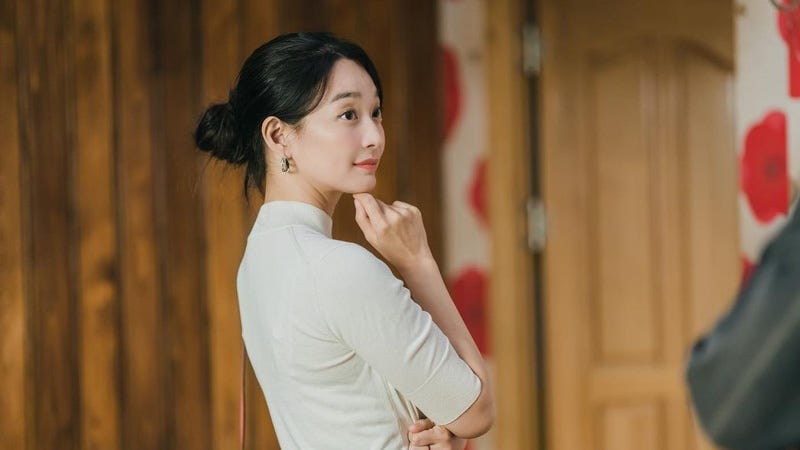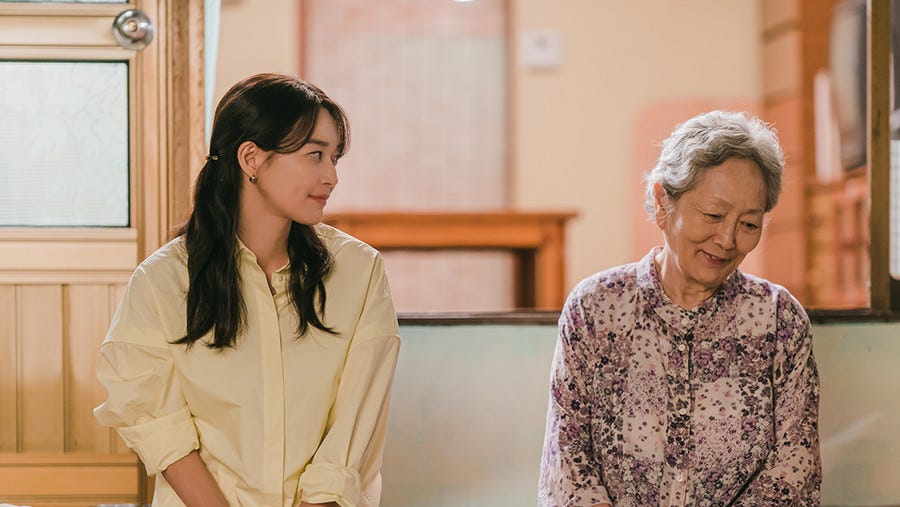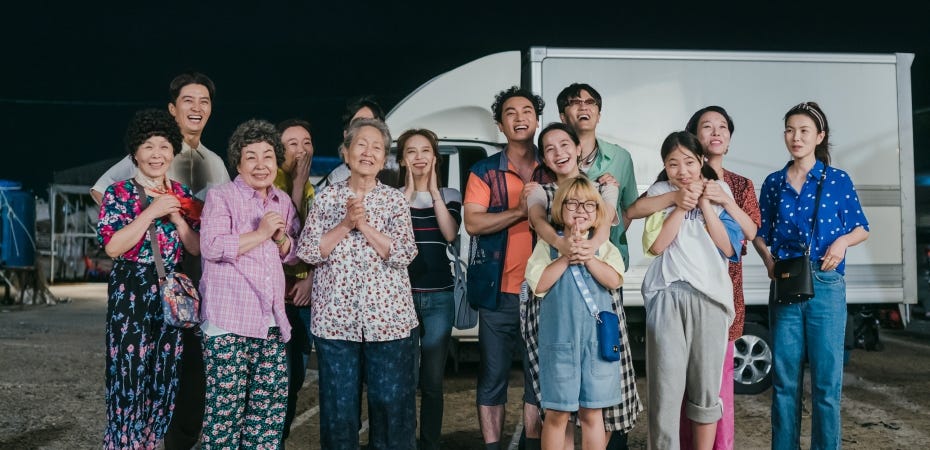First off, hi and welcome. Thank you for subscribing to what I imagine will be a terribly inconsistent newsletter, made obvious by the fact that I am beginning this “Best Of” kdrama list with Hometown Cha Cha Cha. I want to acknowledge that this review (plus the next two-ish reviews) are much more critical than might be expected from, again, a “Best Of” list. However, I included these dramas as examples of how a show might still work for me despite its flaws, and because I probably spent a lot of time thinking about these shows and now I need a place to vent about them.
Another note before we begin: I don’t really want to discuss the Kim Seon-ho of it all, but I also don’t want to ignore the elephant. Please feel free to skip this review if it makes you uncomfortable to think about KSH and his work; I’ll catch you next time.
First off, the question: is Hometown Cha Cha Cha a pastoralist fantasy?
Pastoralist, meaning the idealization of a rural lifestyle, especially in comparison to life in an urban area. Fantasy, in that this kind of idealization is not only impossible but egregious, especially in ignoring the undesirable.
I think the easy answer, when seeing the over-sentimentalization of Gongjin and its residents, is to say yes. Hometown Cha Cha Cha is the latest in a long line of pastoralist Korean dramas, some of which do service to the genre better than others. Like all other Korean dramas, it exists to provide a fantasy, some catharsis, and above all, entertainment. Perhaps it’s unfair to probe too much farther.
The better question: Does Hometown Cha Cha Cha show us the value of a pastoralist fantasy?
My gut reaction is to reject the notion of any value being attached to a pastoralist fantasy. Pastoralism as an aesthetic and literary convention is too heavily associated with the hypocrisies of the upper class that perpetuated the miseries of complex society to begin with. Idealizing a certain way of life is only possible because there is no actual knowledge of that way of life. Pastoralism rises more from ignorance than any actual desire.
But Korean dramas have continually shown us that the stories centered around pastoralist narratives can still land with at least some emotional authenticity, that the stories work for many, many viewers. Perhaps it is because the nature of the viewers desiring the fantasy has changed; perhaps it is because the dramas themselves develop pastoralist narratives with some grounded awareness of the tensions between rural and urban areas in Korea.
In any case, I think it’s a question worth exploring, especially with a drama that, perhaps more than any other popular K-drama from the past few years, tackles the conventions of a pastoralist fantasy head-on.
I’ll admit that the first few episodes rubbed me the wrong way, mostly because of how the show seemingly hadn’t strayed too far from its roots as an adaptation of an early 2000s romantic comedy film. The basic foundations for character work felt reductive and uninspired, laying out an opposites-attract-romance that forced a moral standard onto the two leads. From the beginning, Du-shik is critical and didactic, unwilling to really empathize with Hye-jin’s plight nor accept her sense of boundaries. Yet Hye-jin, on her end, never forces the same judgement onto Du-shik. Much of her antagonism towards Du-shik is reactionary; if he had left her alone, she would have simply done the same.
That’s not to exalt Hye-jin, who clearly deals with her own insecurities by forming a sense of elitism that is frighteningly familiar to most Koreans scratching out a living in a cutthroat version of Seoul. It’s this sense of familiarity that allows Du-shik to behave as he does and remain sympathetic and even desirable. Hye-jin, by reminding the viewer of the effects of city life, is not only a figure who justifies such criticism but is wholly deserving of it. We want to see her broken down by the pastoral fantasy and made to accept that she is not above these simple pleasures, that it may even be better than the cosmopolitan dream life thrusted upon recent generations of Koreans.
Something to consider here: while the pastoralism of Hometown Cha Cha Cha is still a heavily rose-tinted view of life in rural parts of South Korea, it’s hard to say that it’s appealing to the same people such as, say, Marie Antoinette or other European nobility crafting country homes in rural villages. This fantasy belongs to those negatively affected by increased urbanization, whose life in non-rural spaces has been made difficult and cold and draining — the same generation that popularized cottagecore and idealizing living out of a van and disassociating from the impending dread of a tightening housing market. For Koreans, the countryside also retains a heavy element of nostalgia, calling back to a time when young Koreans didn’t deal with a culture of ruthless competition. Of course, such a viewer may still not understand or remember the difficulties of rural poverty, but they do know what it’s like to be poor or to feel like a failure in modern society. It is understandable, then, to see the warmth in a drama like Hometown Cha Cha Cha and believe that life might be better somewhere by the sea.
In light of this, Hye-jin is not a good perspective character. She is not representative for the kind of viewer who would be taken in by this show’s specific pastoralism; Du-shik is a better perspective character. We understand from the beginning that he has a dark, tortured past, that his return to Gongjin was facilitated by some sort of trauma from his life in Seoul. The reveal of his past is further indictment of life spent under the kind of materialism commonly associated with Seoul. From an audience perspective, Du-shik could be more relatable and even more sympathetic.
But the key point is that Du-shik is not our perspective character, and this is where the drama fails to equalize the romance and convince me that it works. Despite his sunny demeanor, Du-shik refuses to be truly vulnerable with Hye-jin or even the other villagers for much of the show. In fact, his friendliness is an ironclad defense against any kind of probing into his past; he breaches boundaries because he knows that the best defense is offense. If he gets too close, then no one can see him clearly.
The entire process of Du-shik falling in love with Hye-jin, however, is defined by his slow discovery of her inner life, her secret sweetness and warmth. Yet the discovery doesn’t come from a sense of patience and understanding so much as him trampeding into her life in so many intervals, on the basis that he knows best. And Hye-jin, again, is not afforded the same privilege. For most of the show, Hye-jin is constantly revealing herself to Du-shik, with her insecurities over her dental practice, her fear and trauma at being almost attacked (twice!), her issues with her family, her difficult college years, and even her feelings for Du-shik. She kisses him first, she confesses first; she takes the first steps forward. Yet rarely during the first two-thirds of the show does Du-shik ever have a sincerely vulnerable conversation with Hye-jin where he reveals anything about himself.
Despite this, I do think Hye-jin’s feelings towards Du-shik have genuine impact, even if the foundations for them feel off. When the two pretend to be a couple for Hye-jin’s parents, it becomes clear as to why Du-shik’s interferences might have felt like something besides completely offensive. Hye-jin grew up without a support system, a system that would have provided criticism and concern as much as love and care. Du-shik never provides his critiques from a place of malice. He does genuinely want Hye-jin to integrate herself into the community.
And that’s where the strengths of this drama lie, and where its pastoralist fantasy is transformed to something more productive. It is, in the end, about a network of care.
Hye-jin is part of the show’s saving grace. For a character who was routinely made to stand on a pedestal and judged for her incompatibility with country-life, Hye-jin retains a sense of warmth and humanity that is partly innate to Shin Mina’s charm as an actress. Yet this warmth never overrides the other elements of her character. She is still prickly and defensive and picky; she creates firm boundaries and is repulsed when they are crossed. These qualities remain in Hye-jin even as she warms to the other villagers and establishes her own network of care among them. More specifically, her main development arc is not a complete rewrite of her personality or even her growing fondness for Gongjin — it’s her ability to navigate her boundaries, to release some of the trauma that built her walls so high.
Her relationship with Du-shik operates as a catalyst, but it’s important to consider how Hye-jin’s relationship with Gongjin is cemented more by her relationships with other villagers — most particularly, her relationship with the other women. Unique to Gongjin is a tribe of motherless girls, and they form the heart of both the village and the drama.
Lest we forget, it’s actually Lee Bong-ryun’s character Hwa-jung who convinces Hye-jin to set up her clinic in Gongjin, and it’s Hwa-jung who remains a steady sense of support for Hye-jin and the other women in the village. I won’t deny the Lee Bong-ryun effect (May unni!!), but Hwa-jung exhibits the kind of town stewardship that Du-shik can only aspire towards. When Hwa-jung reveals to Hye-jin about Nam-sook losing her daughter, it’s with measured grace that she tells her about the relief she felt when Nam-sook regained her voice, how she doesn’t mind the gossip or inappropriate behavior because it is only a sign that Nam-sook is well. It’s a notice to Hye-jin, with none of Du-shik’s high-handedness, that healing is sometimes imperfect and that love is acceptance of those imperfections. It’s something Hye-jin has to remember later on with Du-shik.
And later, as Hye-jin cries, Hwa-jung offers her a bowl of miyeok-guk. It’s an echo of their first meeting, how Hwa-jung offered kindness to a stranger, but it’s also recognition of their sameness. Miyeok-guk is not only a dish offered to new mothers in Korea, but a dish that most children receive from their mothers on their birthdays. Undoubtedly, Hye-jin has gone for some time without miyeok-guk from her mother; undoubtedly, Hwa-jung has gone without miyeok-guk as well. When it is offered from one motherless girl to another, it feels like recognition, like seeing.
It’s a chain that continues from Hye-jin to Ju-ri. One of the most affecting scenes of the show is after the village concert, as Ju-ri sits with her father after accomplishing her life goal of seeing her favorite idol. They have a simple conversation about Ju-ri’s snaggle tooth, and Ju-ri’s father watches his daughter with a mix of heart-bursting fondness and regret. One can only imagine his hopes and fears for his daughter, that she will not only grow well, but that she will grow well without her mother.
It’s understandable, then, that Ju-ri’s father pinpoints Hye-jin as a potential unni for Ju-ri, and how Hye-jin warms to her despite their initially fraught friendship. The moments between them are so emotionally genuine, the way most of the bonds between the other villagers resemble the messy fondness of small town relationships.
In fact, the villagers remain the root for a significant part of the emotional authenticity in this drama. It’s through the villagers that we see where the fantasy breaks; Hye-jin establishes her clinic because there are no dentists for miles. Gam-ri’s phone calls with her son and granddaughter are strained and distant, not because of anyone’s fault, but because it is the reality of having sent off your children to do bigger and better things. And when Gam-ri passes, her funeral march provokes a kind of sadness impossible to replicate by any other scene. The funeral march is a long-time tradition that is now almost unique to the rural parts of Korea; Seoul has forgotten it entirely. As a younger woman, Gam-ri would have participated in the same march for her parents, for her husband, for other villagers. What we see through the march is not just her death, but the entire history of the village and the region, and the way that it is being kept alive in memory of the people who had gone before.
It’s a hallmark of the network of care that exists in Gongjin, and I’d like to think that this is what transforms Hye-jin, that it’s her connections to people who understand her better than she might have ever thought possible.
Understandably, as a rom-com, the drama’s hyperfocus is on Hye-jin’s romantic relationship, but what’s sketched out to surprising detail in the background is the role that the women play in holding the community together. It’s a cultural understanding that women, especially older women, provide a majority of the labor that becomes the backbone of such small communities, and Hometown Cha Cha Cha is only the latest drama to depict this without much fanfare or pandering.
It’s why Du-shik’s attitude towards Hye-jin, especially in the beginning of the drama, feels unjustified. He doesn’t get to hold the moral high ground towards Hye-jin when there are other people, the women, who are actually in the position of holding the village together. Du-shik himself is actually more like Hye-jin, in that he also refuses to allow the villagers to care for him and enforces his own impassable boundaries, albeit in a more roundabout, imperceptible way.
Du-shik does get confronted with the consequences of his impassibility by the third act, but none of these consequences actually significantly change his behavior. In fact, Du-shik has several other moments where he should have been forced to admit he was wrong, such as when Hye-jin tells him that he doesn’t acknowledge criticism of his behavior or when Hye-jin’s father flatly tells him that his cavalier, no-honorifics attitude is one-sided and makes things only better for him. But again, Du-shik doesn’t really make the appropriate changes or even apologize.
It could be argued, of course, that Du-shik simply engaging Hye-jin in their romance is a step forward, and that his past trauma creates certain exemptions from complete vulnerability. Hye-jin returning to Du-shik and telling him that she will wait for him to be vulnerable feels like a powerful moment of love and patience — but only for Du-shik.
Because, lest we forget, Hye-jin was hardly afforded the same courtesy. Although her professional failure was played off for laughs, it’s no small thing to be blacklisted out of an industry and forced to uproot to an entirely new area. She also deserved patience and empathy, and Du-shik instead treated her with prejudice and condescension, repeatedly crossing the boundaries that she asked him not to cross. I’m not saying that Du-shik deserved to be treated the same way by Hye-jin; the scene alone is powerful in its unexpected empathy. However, when placed back in context of their earlier interactions, it causes further imbalance to their relationship. Hye-jin is forced to feel distant from the person she loves, with no idea of when he will allow himself to be vulnerable with her. And Du-shik doesn’t get the chance to make up for it — his secret is revealed before he can tell her himself.
I don’t mean to barrage on about the main relationship of the show, especially because I do understand why people felt affected by the main storyline. Healing from trauma through the love and care of others is a powerful thing to witness and to imagine for oneself; Du-shik can provide that avenue of catharsis for the audience. However, I wish it didn’t happen at the expense of the female lead or even the other characters of the show. Gam-ri’s passing is less about Gam-ri than it is about Du-shik and his character arc; despite being one of his core relationships and connections to the village, they never have a clear moment where Du-shik acknowledges directly to Gam-ri her role of care and support in his life. It is only after she has passed that Du-shik can make those acknowledgements on a one-sided basis and use her words to find some form of healing in the aftermath of his traumatic reveal.
Still, there is value in Du-shik’s character, which I will acknowledge even if it was unintended. The reason Hometown Cha Cha Cha’s pastoralist fantasy works is not because of an idyllic seaside background or because the lives of these characters seem any easier than our own. The heart of the show is, again, its network of care. The fantasy is that this network can exist so completely for our main characters, even with all of their missteps, and that it can be as transformative as it becomes. If the drama had taken the time to create more equal footing for Du-shik and Hye-jin, or even just allowed Du-shik to make full reparations for his own missteps, the romance would not only have worked but been fully integrated into this network of care. Du-shik’s character instead becomes a testament to not only how this network may not be enough if the individual cannot fully engage, but also that it can still be there to pick up the pieces.
Fantasy is a diversion from reality, a mirror world where things flow in the opposite direction of what we know. Korea is hardly the only country whose community-based culture has become increasingly broken down by the rampant individualism of late stage capitalism. As a Korean drama, Hometown Cha Cha Cha is just one of many stories that seeks to show a mirror world, through characters we understand as reflections of ourselves. Despite its faults, the show is worth watching because watching dramas that depict these communities is always an empowering act. It allows us to find the argument to care for the people around us; it allows us to imagine similar networks of care into reality.









JANE THIS IS INCREDIBLE!!! you have such an incredible insightful eye in hccc, the breaking down of the pastoralist fantasy and how it works in south korea, among many other countries that have rapidly industrialized and gone fully into capitalism, and how you see the effects on other characters. the most touching part for me personally is your touching upon the network and care the women of Gongjin have for one another, and motherless daughters. it was beautiful and i'm so excited to see what you will write next!